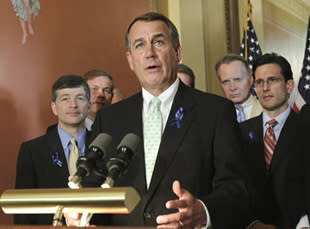 The Ticket
The TicketAs Congress battles over payroll tax cut extension, government shutdown looms

It's brinkmanship time yet again in Congress as lawmakers attempt to close out the year with votes to continue a payroll tax cut, extend long-term jobless benefits, and fund the government to avoid yet another shutdown.
Lawmakers on both sides of the aisle would like to pass some version of all of these measures, but discrepancies over how exactly to make that happen has gummed up progress in Congress. And both sides are using votes on the measures as bargaining chips.
Take for example Tuesday night's House passage of a payroll tax cut extension: what appeared to be progress was mostly a symbolic gesture since Republicans knew full well that Senate Democrats had vowed to reject the Republican-backed measure and President Obama had threatened to veto the bill. Many Democrats, including the president, objected to add-ons to create the Keystone XL oil pipeline and place new restrictions--including drug testing--on an unemployment benefits extension.
"Why are we wasting precious time?" Democratic Rep. Jim McGovern (Mass.) asked on the House floor prior to the vote.
On Wednesday, Republicans hit back, accusing Democrats of playing politics.
"This isn't just irresponsible, it's reckless," Senate Minority Leader Mitch McConnell (R-Ky.) said on the House floor Tuesday while discussing the payroll tax cut bill.
But as the high stakes fight plays out in Congress, the pressing issue of funding the government is ticking down to a Dec. 16 deadline.
So where does that leave us?
Below, we run through the major tasks remaining for Congress in 2011 and the ways in which they've been linked:
Payroll tax cut extension
A measure that lowers the Social Security tax rate from 6.2 percent to 4.2 percent for an estimated 160 million Americans will expire Dec. 31 without an extension. The White House estimates that the increase back to a 6.2 percent rate will cost a middle-class American family an average of $1,000 next year. Both parties would like to give Americans this cut--perhaps even reduce the rate further--but they disagree over how to pay for it.
Democrats are pushing an income surtax on millionaires and billionaires to cover the extension, but Republicans reject that plan, citing their pledge not to raise taxes. They are instead proposing a pay freeze and increased pension costs for federal workers, raising Medicare costs for seniors earning over $80,000, and other provisions to make up the funds. The bipartisan desire for this extension has made it into a major bargaining chip for both parties as they tackle the other items on their schedule.
Long-term unemployment compensation extension
If Congress fails to reauthorize extended benefits for the long-term unemployed by Dec. 31, an estimated 1.8 million Americans will stop receiving benefits the first week of January. Additionally, unemployed Americans who reach "long-term" status in 2012 will then see their benefits run out sooner.
Republicans included unemployment benefit extension language in their payroll tax cut extension bill passed by the House Wednesday, but Democrats rejected the measure's new restrictions on long-term unemployment compensation including requiring drug testing for applicants and reducing the time frame for eligibility from 99 to 59 weeks of unemployment.
Reforming Medicare payments (the "doc fix")
Lawmakers on both sides of the aisle for years have been blocking a change--the Sustainable Growth Rate (SGR) formula--in how physicians are paid for services provided under Medicare. The adjustment was first enacted in 1997.
For the past several years, Congress has voted to delay the cuts right before they would take effect. If Congress fails to delay its implementation again this year, they will go into effect Jan. 1, resulting in an estimated 27.4 percent reduction in physician pay. Congress wouldn't have to engage in this annual blockage if they changed the formula into something both parties support--but that would require much more time and effort than simply delaying the change. Republicans included language related to a "doc fix" in their payroll tax cut extension passed by the House Wednesday, but, as we've noted, Democrats are vowing to block its passage.
Funding the government
Looming over all of these tasks before Congress is a potential government shutdown: A stopgap measure to fund the government expires Dec. 16. (Congress has brought us to the brink of government shutdown several times this year.) Congressional leaders say they have a $1 trillion "megabus" omnibus bill in the works that would wrap together multiple necessary appropriations bills to keep areas of the government operational.
But the major unknown is whether this omnibus bill will be held hostage and used as a bargaining chip in the battle over the payroll tax cut extension or any of the other pending legislative battles. Democrats have told the press they don't want Republicans to leave Washington for the holiday break without forcing them to pass a payroll cut extension. Republicans are accusing Democrats of holding the government hostage to get their way.
Other popular Yahoo! News stories:
Want more of our best political stories? Visit The Ticket or connect with us on Facebook and follow us on Twitter.
